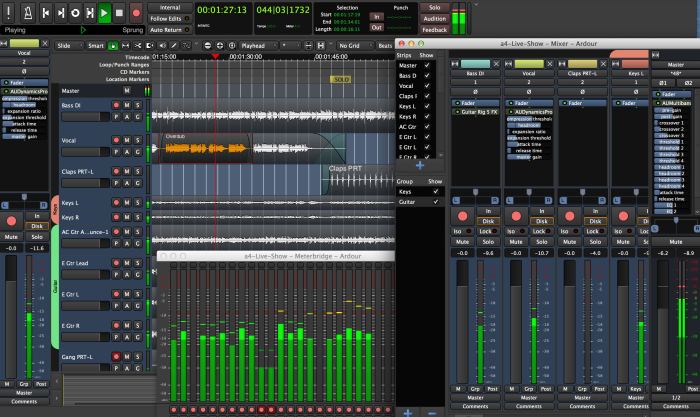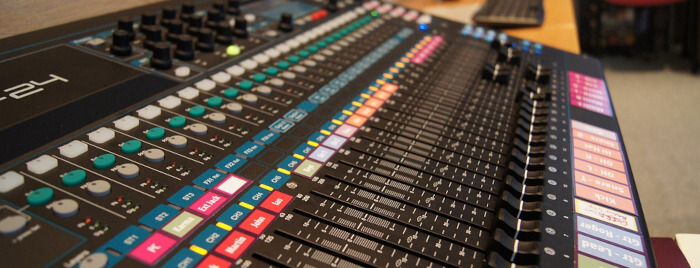Ardour is a powerful digital audio workstation that gives you everything you need to record, edit, mix, and arrange professional audio. It is similar to other software like ProTools, Nuendo, Sonar and Logic, and capable of replacing analog or digital tape systems.
Specifically, Ardour is a multichannel hard disk recorder (HDR) and digital audio workstation (DAW). It can be used to control, record, edit and run and complex audio setups.
Ardour supports pro-audio interfaces through the ALSA project, which provides high quality, well design device drivers and API’s for audio I/O under Linux. Any interface supported by ALSA can be used with Ardour. This includes the all-digital 26 channel RME Hammerfall, the Midiman Delta 1010 and many others.
Ardour has support for 24 bit samples using floating point internally, non-linear editing with unlimited undo, a user-configurable mixer, MTC master/slave capabilities, MIDI hardware control surface compatibility. It supports MIDI Machine Control, and so can be controlled from any MMC controller and many modern digital mixers.
Ardour contains a powerful multitrack audio editor / arranger that is completely non-destructive and capable of all standard non-linear editing operations (insert, replace, delete, move, trim, select, cut / copy / paste). The editor has unlimited undo / redo capacity and can save independent “versions” of a track or entire piece.
Ardour’s editor supports the community-developed LADSPA plugin standard. Arbitrary chains of plugins can be attached to any portion of a track. Every mixer strip can have any number of inputs and outputs, not just mono, stereo or 5.1. An N-way panner is included, with support for various panning models. Pre- and post-fader sends exist, each with their own gain and pan controls. Every mixer strip acts as its own bus, and thus the bus count in Ardour is unlimited. You can submix any number of strips into another strip.
Ardour’s channel capacity is limited only by the number on your audio interface and the ability of your disk subsystem to stream the data back and forth.
JACK (the JACK Audio Connection Kit) is used for all audio I/O, permitting data to be exchanged in perfect samplesync with other applications and/or hardware audio interfaces.
Ardour is sample rate and size neutral – any hardware formats from 8 to 32 bits, rates from 8kHz to 192kHz. Internal processing in 32/64 bit IEEE floating point format.
Features include:
- Unlimited audio tracks and buses.
- Multichannel recording.
- Input gain control.
- Non-destructive editing with unlimited undo/redo:
- Adjust everything about your session and its timeline layout.
- Trim regions, crossfade by dragging, timestretch useful samples, split and regroup audio, move non-contiguous selections around, identify and use song chunks.
- Full automation support.
- Automatic track delay compensation.
- Sample accurate automation.
- Powerful mixer:
- 32 bit floating point mixer offers endless headroom and guaranteed bit-for-bit fidelity for 24 bit samples.
- Mix any number of tracks that your hardware can handle, and you can use both MMC and generic MIDI control surfaces to manage the mix.
- Unlimited tracks/busses/plugins.
- Timecode synchronization.
- Hardware control from surfaces like the Mackie Control Universal.
- Relies on plugins to enable many features from FX processing to dynamics control:
- Supports the LADSPA plugin API.
- More than 200 LADSPA & LV2 plugins freely available.
- Runs with any hardware supported by JACK.
- Supports a wide range of audio-for-video features such as video-synced playback and pullup/pulldown sample rates.
- Standard file formats (BWF, WAV, WAV64, AIFF, CAF & more …).
- Hi-DPI support.
Website: ardour.org
Support: Manual
Developer: Paul Davis and many contributors
License: GNU General Public License v2.0

Ardour is written in C++. Learn C++ with our recommended free books and free tutorials.
Return to Make Music | Return to Digital Audio Workstations
| Popular series | |
|---|---|
| The largest compilation of the best free and open source software in the universe. Each article is supplied with a legendary ratings chart helping you to make informed decisions. | |
| Hundreds of in-depth reviews offering our unbiased and expert opinion on software. We offer helpful and impartial information. | |
| The Big List of Active Linux Distros is a large compilation of actively developed Linux distributions. | |
| Replace proprietary software with open source alternatives: Google, Microsoft, Apple, Adobe, IBM, Autodesk, Oracle, Atlassian, Corel, Cisco, Intuit, and SAS. | |
| Awesome Free Linux Games Tools showcases a series of tools that making gaming on Linux a more pleasurable experience. This is a new series. | |
| Machine Learning explores practical applications of machine learning and deep learning from a Linux perspective. We've written reviews of more than 40 self-hosted apps. All are free and open source. | |
| New to Linux? Read our Linux for Starters series. We start right at the basics and teach you everything you need to know to get started with Linux. | |
| Alternatives to popular CLI tools showcases essential tools that are modern replacements for core Linux utilities. | |
| Essential Linux system tools focuses on small, indispensable utilities, useful for system administrators as well as regular users. | |
| Linux utilities to maximise your productivity. Small, indispensable tools, useful for anyone running a Linux machine. | |
| Surveys popular streaming services from a Linux perspective: Amazon Music Unlimited, Myuzi, Spotify, Deezer, Tidal. | |
| Saving Money with Linux looks at how you can reduce your energy bills running Linux. | |
| Home computers became commonplace in the 1980s. Emulate home computers including the Commodore 64, Amiga, Atari ST, ZX81, Amstrad CPC, and ZX Spectrum. | |
| Now and Then examines how promising open source software fared over the years. It can be a bumpy ride. | |
| Linux at Home looks at a range of home activities where Linux can play its part, making the most of our time at home, keeping active and engaged. | |
| Linux Candy reveals the lighter side of Linux. Have some fun and escape from the daily drudgery. | |
| Getting Started with Docker helps you master Docker, a set of platform as a service products that delivers software in packages called containers. | |
| Best Free Android Apps. We showcase free Android apps that are definitely worth downloading. There's a strict eligibility criteria for inclusion in this series. | |
| These best free books accelerate your learning of every programming language. Learn a new language today! | |
| These free tutorials offer the perfect tonic to our free programming books series. | |
| Linux Around The World showcases usergroups that are relevant to Linux enthusiasts. Great ways to meet up with fellow enthusiasts. | |
| Stars and Stripes is an occasional series looking at the impact of Linux in the USA. | |
